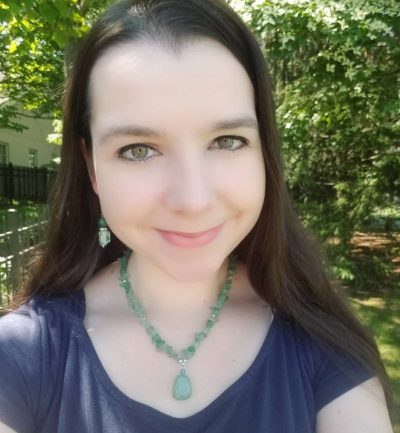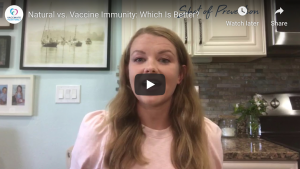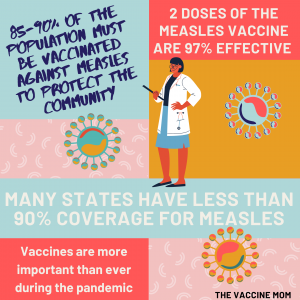SERIES: WHAT DO HEALTH CARE PROFESSIONALS HAVE TO SAY? *Melissa, the Physician Assistant
Melissa is a physician assistant, principal faculty in the University of Charleston Physician Assistant Program, Steering Committee Co-Chair for the WV Immunization Network, and President of the WV Association of Physician Assistants. She worked for almost a decade in primary care before moving into nephrology/internal medicine.
She’s well-versed in vaccine research and the importance of vaccination due to her extensive schooling, working many years in the field, her teaching and research, and through working in vaccine outreach. She said before she ever went into medicine, vaccinating made sense to her—it’s something you do because it’s important to your child’s health. However, she didn’t realize how vocal and heated the anti-vaccine community could be until she began practicing.
I remember being gobsmacked that people were so against vaccines. Of all the medical interventions we learned about, they seemed like one of the safest and most effective of any.
While Melissa worked in primary care, she encountered people of all health levels and ages. She’s now seeing patients of advanced age with multiple chronic health conditions like chronic kidney disease, hypertension, hyperlipidemia, diabetes, and heart disease.
It was a matter of course to ask about preventative health measures, so at the same time we would bring up their last mammogram, colonoscopy, etc., their age-appropriate vaccines would get brought up, and that would let us open a discussion about them. Now that I am working in nephrology/IM, it is standard triaging procedure to ask all patients about their vaccine status.
Melissa says that the majority of patients she sees now in nephrology/IM accept vaccination without question. This may have to do with the patients being in poor health and knowing how important it is to do whatever they can to prevent future illnesses and complications.
Denying vaccines is often a privilege of people who are generally healthy. They seem to rethink their status after they start to develop chronic and serious disease.
When it comes to parents, she says around 10-20% of parents/patients were vaccine-hesitant, mostly to non-mandatory vaccines such as influenza and HPV vaccines.
For the HPV vaccination, many parents seem to think their child would never need protection because they don’t see their child as someone who might have multiple sexual partners or who would choose to be intimate with someone that has had multiple partners. There’s also a ton of misinformation about the safety of the HPV vaccine, which I think is in part due to the fact that it came onto the market around the same time that social media use became very widespread. For the flu vaccine, there’s a lot of doubt over its efficacy–again, those people who are generally healthy seem to think that the flu is not a serious threat to them.
Melissa says that patience and understanding are key to talking to vaccine-hesitant patients and parents. Fear and misinformation are often the reasons parents make the decision to avoid vaccines.
Most of the time, the decision to avoid vaccines is one born out of fear—that the risk of vaccines is too great. Being pushy or overbearing to someone who is afraid is only going to make them pull further away, in my experience. I think gentle questioning and motivational interviewing to get to the heart of their concerns, coupled with easily comprehensible education and open conversation, is a lot more effective.
When it comes to the anti-vaccine movement, Melissa says there is a core group of people that profit off the fears and insecurities of the public without the concern of the effects on the health of the people who are listening to their advice.
Many of those profiteers actually will use modern medical interventions for themselves when need be, but will encourage their followers to use “natural” remedies instead. Then, there’s a group of people who seem like they have problems coming to terms with the health conditions their children have. It’s very difficult for some people to accept that they can do “all the right things” and still have a child with a developmental delay, allergic disorder, autoimmune disorder, etc. It makes them feel better to blame it on something they feel like they can control—like vaccines, or exposure to WiFi, or any one of a hundred alleged “toxins.” If it’s the fault of something they can avoid in the future, that means that their subsequent children might not have the same problem. It’s a serious issue and my heart breaks for those people who refuse to accept that sometimes, kids just have health issues that are beyond anyone’s control.
Melissa wants vaccine-hesitant parents to realize their healthcare providers, and people who work in research have their best interests at heart.
Virtually all (healthcare professionals and scientists) have put their money where their mouth is and use the same medical interventions they recommend to their patients on their own selves and their families. If someone really feels like their health care provider is “bought out by Big Pharma,” I would encourage them to find a licensed physician, PA, or NP who they do connect with and who they trust to give reliable information.
As far as the anti-vaccine community, Melissa says healthcare workers and scientists aren’t their enemies. All parents want the best for their children, and so do their healthcare providers. She encourages those resistant to vaccines to consider having an open mind and sitting down with their child’s provider to get accurate information about vaccines. Most providers want parents to feel comfortable making the informed decision to vaccinate.
Melissa vaccinates her own children, as she knows vaccines are the best way to prevent potentially life-threatening diseases.
(Vaccines) protect children, especially the ones that are too young to be vaccinated. I’ve seen multiple kids hospitalized for illnesses like flu and pertussis, and seeing their little bodies devastated from vaccine-preventable illnesses is absolutely heartbreaking. I obviously get my shots to protect myself as well, but I really do it first and foremost for my kids and all the other little ones out there.
*Melissa is speaking on her own behalf and not on the behalf of her workplace or organizations she represents.


